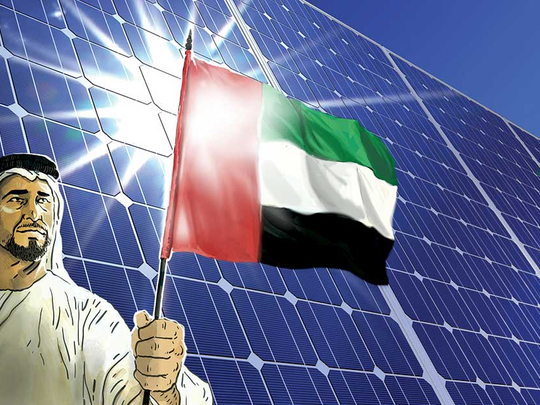
The transformation towards clean energy has positive environmental, social and economic effects, making conventional energy less competitive and attractive for further investments. His Highness Shaikh Mohammad Bin Rashid Al Maktoum, Vice-President and Prime Minister of the UAE and Ruler of Dubai, once observed that, “Every investment in the development of clean energy sources is at the same time an investment to protect the environment for future generations.”
Clean energy is a great opportunity for the future as demand keeps rising around the world. Oil prices and improved technology have helped increase the share of renewable energy in the energy mix. This makes technology a key factor in the transformation towards clean energy.
The UAE encourages research and development (R&D) in solar energy, to enhance energy security and sustainability. What the UAE has achieved is a great source of pride for all citizens and residents. To support the Dubai Clean Energy Strategy 2050, we are working to diversify the energy mix, so clean energy will generate 7 per cent of Dubai’s total power output by 2020, 25 per cent by 2030 and 75 per cent by 2050.
We are shaping the future of energy and preparing plans and initiatives to keep up with the latest developments in science and technology. Dubai is the only city in the Middle East and North Africa (Mena) region to launch such a promising strategy, with specific targets and deadlines that outline the future of energy up to 2050.
The Dubai Electricity and Water Authority (Dewa) actively supports the Dubai Future Agenda to establish the largest government accelerators in the world, and adheres to a clear and integrated strategy based on innovation and anticipating the future, and works to further implement new initiatives, while continuously supporting R&D to cope with rapid technological development. We strive to ensure the continuity of sustainable development and environmental protection, and achieve a balance between economic and social development. This is done by achieving targets that focus on air quality, the conservation of water resources, increasing the use of clean energy and implementing green development.
Dubai is a pioneer in the development of renewable energy and is at the forefront of alternative energy, exploring and seeking new methods of enhancing efficiency, rationalising the consumption of natural resources and finding alternative solutions for conventional energy to achieve the sustainable development.
Record-low solar energy costs
Dubai set a world record in the cost of solar energy for the 800MW third phase of the Mohammad Bin Rashid Al Maktoum Solar Park, which is the largest single-site solar park in the world, with a planned capacity of 5,000MW by 2030, and a total investment up to Dh50 billion. This has helped to reduce the costs of such projects globally, amid increasing competition, especially for the projects that come after Dewa’s announcement of this price. This in turn, will contribute to the sustainable development of countries around the world.
Dubai focuses on creating an environmentally-friendly energy mix comprising 25 per cent from solar energy, 7 per cent from nuclear power, 7 per cent from clean coal, and 61 per cent from gas by 2030. Dubai has joined the Building Efficiency Accelerator (BEA) partnership, launched by the United Nations, to double the rate of energy efficiency by 2030. Building efficiency policies can result in 25-50 per cent reduction in energy demand from both new and existing buildings, saving money and reducing pollution.
Dewa achieved international competitive results, which have surpassed leading European and American companies. Dewa’s results are among the best internationally for customer minutes lost per year. Dewa’s figures reached 3.87 minutes, compared to 15 minutes recorded by leading utilities in the European Union. We cooperate with partners and educational institutions all over the world, to invest in innovation and creativity, and we signed several MoUs with international organisations to train our employees in Europe and the United States. We work relentlessly to exchange expertise and learn about the latest international developments in energy, water and environment, and enhance knowledge exchange with international organisations. We sent a number of our engineers to international institutions to study renewable energy and we cooperate with the International Renewable Energy Agency and the United Nations to research renewable and alternative energy, to reduce the carbon footprint and limit greenhouse gas emissions.
Carbon Abatement Strategy
Dubai strives to enhance the development of renewable energy, sustainability and the environment, while improving efficiency to make Dubai the city with the lowest carbon footprint in the world. The Dubai Supreme Council of Energy has launched the Carbon Abatement Strategy to reduce carbon emissions by 16 per cent by 2021. This will contribute to making Dubai one of the cities with the lowest carbon footprints worldwide.
The clean and renewable energy sector has recently witnessed huge developments, in preparation to bid farewell to the last drop of oil. The sector has also witnessed great technical development in the fields of natural resources such as solar energy, with an increased commitment to preserving the environment for generations to come.
— Saeed Mohammed Al Tayer is the managing director and CEO of Dubai Electricity and Water Authority (Dewa)









